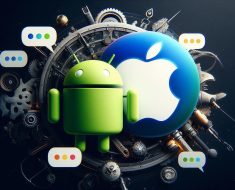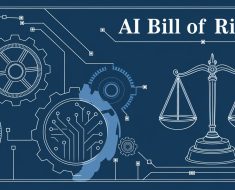OpenAI has been clear on what their ultimate goal is in developing AGI: to create something that will “benefit all of humanity.” But what happens if that technology steps on the toes of workers? What happens when robots replacing people becomes a reality?
The truth is, we don’t have to wonder anymore. AI is already replacing workers in different sectors, and more will fall victim to it.
In this blog article, we’ve compiled insights from ten industry leaders on how AI can replicate, and even outperform, human tasks in these roles. In doing so, we will explore the 10 jobs considered most susceptible to replacement by AI capabilities in the coming years. This article is an important overview of how AI will shape the years to come.
The Jobs In Danger Because of AI
The rapid and unprecedented rise of artificial intelligence is transforming industries and automating tasks that were once exclusively performed by humans. The following are the jobs in danger because of AGI according to industry experts:
Data Entry & Factory Jobs
It’s no secret that data entry and factory work are being taken over by new technology. It’s been happening for years, with tools such as OCRs being able to extract relevant information from a photo or a document and automated transcription for voice files. And it’s poised to worsen as AI becomes more prominent in the sector.


Here’s what Shane Pollard, CTO of SportPass, has to say about the matter:
“Every job has a level of risk with […] AI becoming more mainstream. There are two jobs most at-risk based on [how easy it is for an] AI to replicate the core functions of the job requirements.
First, data entry roles. […] AI can already scan, read documents, and combine tasks; take the scanned text; and add it to the correct documents. This could reduce the headcount in data entry positions so that there is a manager of systems.
Second, companies [could also replace factory workers in two to three years when they] explore autonomous robot workforces like Amazon’s factory of drone workers. This would put millions of factory workers out of jobs. The pricing of the tech will come down significantly and allow small [and] medium-sized businesses to try the AI-driven workforce of factory operators.”
Content Writing
As a content writer myself, I’d be lying if I said I’m not scared of ChatGPT. The bitter pill that I, and countless others, have to swallow is that we’re expendable. This issue extends beyond the digital space too, with threats of being replaced with AI hanging over Hollywood writers during the WGA Strike earlier this year. So, we have to change, adapt, and learn how to coexist with AGI.


But, don’t take it from me. Instead, listen to the insights of Dmytro Sokhach, industry veteran had to say:
“As an SEO and digital marketing specialist with 14 years of experience, I believe content writing is among the professions most at risk because of AI development. Even now, in 2023, AI can generate high-quality content when given the right prompts.
I believe that in the future, because of improvements in its algorithms, many AI systems will generate articles that people will read. For example, BuzzFeed has already been using AI to write travel guides. They’ve published over 40 articles generated by AI.
On the other hand, authors who share their own experiences, expertise, and real-life cases, in my opinion, will still be safe. This is because of the incapability of AI tools to generate first-hand experience. However, authors who rely solely on information from the top 10 Google search results to write articles may need to consider exploring other job opportunities.”
Transportation Jobs
Even before ChatGPT, there has been numerous talks about autonomous trucks (which, in itself, is a by-product of AI) replacing truckers. This is significant because there are more than 3.5 million truckers in the USA today, representing one of the largest sectors in the whole country.


Now that fear’s becoming more and more of a reality. Let’s hear what Keith Sant, founder and CEO of Kind House Buyers thinks there will be some impacts:
“The development of artificial intelligence (AI) has brought about many advancements and benefits to various industries, but it also raises concerns about potential job displacement. One sector that is likely to be heavily impacted by AI is transportation, specifically with the introduction of driverless cars.
Currently, there are millions of jobs worldwide that involve driving, such as taxi and truck drivers, delivery personnel, and public transportation operators. With the rise of AI-powered, self-driving vehicles, these jobs are at risk of becoming obsolete. Driverless cars don’t need human operators; they use algorithms and sensors to navigate roads and traffic, potentially more efficiently than humans. This may lead businesses to prefer driverless vehicles, reducing the demand for human drivers.”
Graphic Design
When Midjourney and DALL-E came out, we were so blinded by this new technology that we didn’t fully consider the implications of it, particularly for digital artists and graphic designers. We’re seeing people struggling to sell their art because everyone now has access to these tools.


To this day, there’s a lot of debate about AI art. Is it ethical? Is it plagiarism? To shed light on those concerns, along with a couple insights into the future of graphic design, here’s Derek Capo, the COO of Starquix:
“Graphic designers. AI will continue to improve the generation of images to the point of perfection. It will directly compete with humans working in e-commerce and other industries. AI can quickly produce multiple variations of a design for A/B testing at a fraction of the time a human would. Still, it would need the trained eye of a human to be its steward.”
Marketing
A marketer’s job can be summarized to three words: outreach and conversion. However, those three words contain a lot of work in between. Creating content, gaining an audience, retaining customers. What happens if a technology comes along that can do all those in a fraction of the cost?


What happens if it’s already here?
Nikhil Jogia, managing director of Jogia Diamonds, shares her thoughts on the future of marketing in this new era:
“Marketing professionals are facing stiff competition from artificial intelligence, which has created an environment where anyone can produce effective marketing campaigns. With tools to generate text, videos, animations, and images, the barriers to entering the marketing field are rapidly disappearing.
This means that the conventional path to becoming a marketer — through academic training and gaining qualifications — may become less critical. As marketing becomes more intertwined with AI technology, the industry seems set to become a non-professional career path.”
Fast-Food Industry
Just like factory workers and truckers, the fast-food industry is at risk of being taken over by automated machines that can do repetitive tasks at less cost. With more than 4.6 million fast food workers in the United States alone, there’s no doubt that the implications of AI displacing these workers will have serious impacts on the world economy.


Here’s Danilo Miranda’s take on the matter, straight from the managing director of Presenteverso:
“The fast-food industry will probably see significant impacts, as many food preparation tasks in these sectors involve routine processes that can be automated. Also, the food service industry, which doesn’t require niche talent and technical skills, is poised for risk from AI advancements.
Cashiers […] and food preparation workers, both which are already [frequently automated] in the food industry, are two jobs that are most at risk in the following years, or even months.
These examples illustrate the broader trend of automation in sectors that rely heavily on routine and repetitive tasks. While AI and automation can improve efficiency and reduce costs for businesses, affected workers must acquire new skills and transition to roles that require creativity, problem-solving, and emotional intelligence, which are less easily automated.”
Customer Service Industry
Despite the obvious downsides, AI being behind the help desks is actually something I’d support. But, of course, that has to come in the future: when LLMs have the capacity not only to learn, but to improvise.


And it seems like I’m not the only one. Let’s take a look at what Alex Mastin, the CEO and founder of Home Ground, has to say:
“There’s a lot of concern over whether or not AI is going to take over certain industries. While I’m of the mindset that AI is and will continue to be a tool enhancing the efficiency of certain roles, it’s not unreasonable to believe that AI may take over customer service helpline jobs.
This may not be a bad thing, though. Since we can program AI to understand and grasp company policies and expectations, it can likely be helpful for fulfilling customer service requests. Not only that, but AI doesn’t need to sleep, so any customer can call at any time of the day and receive answers to their questions.
I expect generative AI […] to be present in an additional 25% or more of customer service industry jobs in the next year. So, I would say it’s becoming an increasingly prominent tool in the customer service industry.”
Legal Assistants and Paralegals
Earlier this year, OpenAI made noise after their GPT-4 model passed the bar exam. Does that mean it can replace lawyers? No. But it does prove that it can complete clerical tasks without any hitch.


Alex Freeburg, the owner of Freeburg Law, shares his thoughts on the matter:
“Legal assistants and paralegals might find their roles evolving as AI becomes more capable of performing tasks like research and organization.
AI programs, like Casetext, are already undertaking document review, legal memo preparation, and compliance checks. Yet, it’s important to note that while AI’s role in the legal sector is growing, we’re not at a stage where it can entirely supplant the intricate, judgment-based expertise that human legal assistants offer. However, if this trend continues, legal assistants and paralegals may find themselves at risk of being replaced by AI.”
Insurance Underwriters
Underwriters are no strangers to risk — but no one could’ve prepared them for the sudden rise of artificial intelligence in society. Get the lowdown from Secret Florists’ Co-Founder, Yoana Wong, on her perspective regarding the matter:


“AI algorithms can assess risk and make accurate underwriting decisions, potentially replacing human underwriters. The insurance sector will be affected, leading to a reduced need for manual risk assessment and decision-making.
AI can analyze vast amounts of data, including historical trends, customer profiles, and policy details, to determine risk accurately and efficiently. This automation can streamline the underwriting process, decreasing costs and improving operational efficiency.
While AI cannot fully replace human judgment in complex cases, it can handle routine underwriting tasks effectively. The insurance industry will need to adapt to this change, focusing on reskilling and upskilling employees to work alongside AI systems and handle more complex cases that require human expertise.”
Accounting
All my life, I’ve been surrounded by accountants. And again, all my life, I’ve been hearing these exact words from them:
“Don’t go into accounting. It’s a dying industry.”


It may have been a slow death at first, but its doom has certainly been hastened up by AGI. John Ross, CEO of Test Prep Insight, weighs in on the subject:
Industry Leader Insights
“For the last couple of years, businesses have been sounding the alarm about the shortage of accountants. Good accountants, especially CPAs, are more scarce than ever. I understand why, too. It’s a thankless, monotonous job with excruciatingly tedious work.
But, I honestly don’t worry about the long-term shortage too much, because I believe that accountants are going to be the first on the chopping block when AI reaches its full potential.
Accounting is the perfect example of tedious, predictable, and repetitive task-based work that AI was built to take over. There is no reason you need an accountant to create invoices, reconcile transactions, or create amortization spreadsheets. AI will be more than capable. You will still need some accountants to steer the AI-based accounting tools and provide advice to management, but I think this is largely a dying profession.”
In A Nutshell
So, who really are the people getting displaced by AI?
Danilo Miranda put it best: it’s those people whose jobs deal with “routine and repetitive tasks.” I hate to say it, but it’s the harsh reality.
As technology continues to advance rapidly, we need to adapt to stay relevant. This may require reskilling, upskilling, or transitioning to roles that involve more complex skills like creativity, strategy, and emotional intelligence. If there’s one thing that AI still lacks, it’s the capacity for human judgment, creativity, and empathy.
Nobody knows what will happen tomorrow, but it pays to stay versatile and open to change during this great shift. By working with (rather than against) artificial intelligence, workers can continue bringing value in our increasingly automated world.





